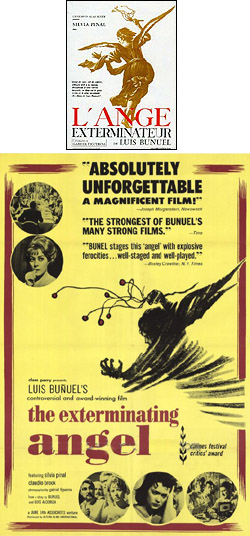
Luis Bunuel is widely regarded as the greatest film director in the history of Spain, and one of the most influential filmmakers in the history of cinema in general. He was a Catholic atheist. He was also a leading Surrealist and was a close collaborator of Salvador Dali.
From: John Baxter, Bunuel, Carroll & Graf Publishers: New York City (1994), pages 258-259:
Bunuel first used the idea in the unproduced short, The Castaways of Calle Providencia, written with Alcoriza, though it could be traced back to L'Age d'Or, where a cart rumbles unremarked through a drawingroom soiree and a formal concert is enlivened (but not interrupted) by violent death and sexual delirium. Now he and Alcoriza fleshed it out into The Exterminating Angel.Baxter, page 261:The title is Jose Bergamin's. He mentioned it at a peña [pena] in Madrid during pre-production for Viridiana, and Luis liked it enough to buy it. Bergamin claimed the phrase was biblical, specifically from the Book of Revelations. Yet although that collection of visionary raving has no shortage of destroying, rampaging and warning angels, none is described as 'exterminating'.
Bunuel was indifferent to provenance. His Sadeian taste for the apocalypytic was tickled by the vision of an omnipotent power visiting death on mankind like a farmer spraying insecticide on locusts. Over the years he gave various other sources for the name: the motto of a Spanish religious group, the Mormons' Angel Moroni, and a Valdes Leal painting of an angel with a six-thronged whip scourging a penitent before the throne of God, an image Bunuel liked so much that it was used on the film's poster. In fact the quote is from 2 Samuel 24:16, where God sends an angel to punish David. 'And when the angel stretchd out his hand upon Jerusalem to destroy it, the Lord repented him of the evil, and said to the angel that destroyed the people, it is enough.' The French Bible translates this as: 'L'Ange etendit sa main vers Jerusalem pour l'exterminer: mais Iohve se repentit du mal et dit a l'Ange exterminateur de la population: "Assez!"' Nobody has satisfactorily explained its relevance to the film. Raymond Dugnat's suggestion that the 'angel' is 'the spiritual climate of bourgeois confrontation, drawn to its (desired) conclusion of inner paralysis' is as good -- or as bad -- as any.
The year's only serious contenders for Best Film at Cannes 1962 were The Exterminating Angel and Antonioni's The Eclipse...